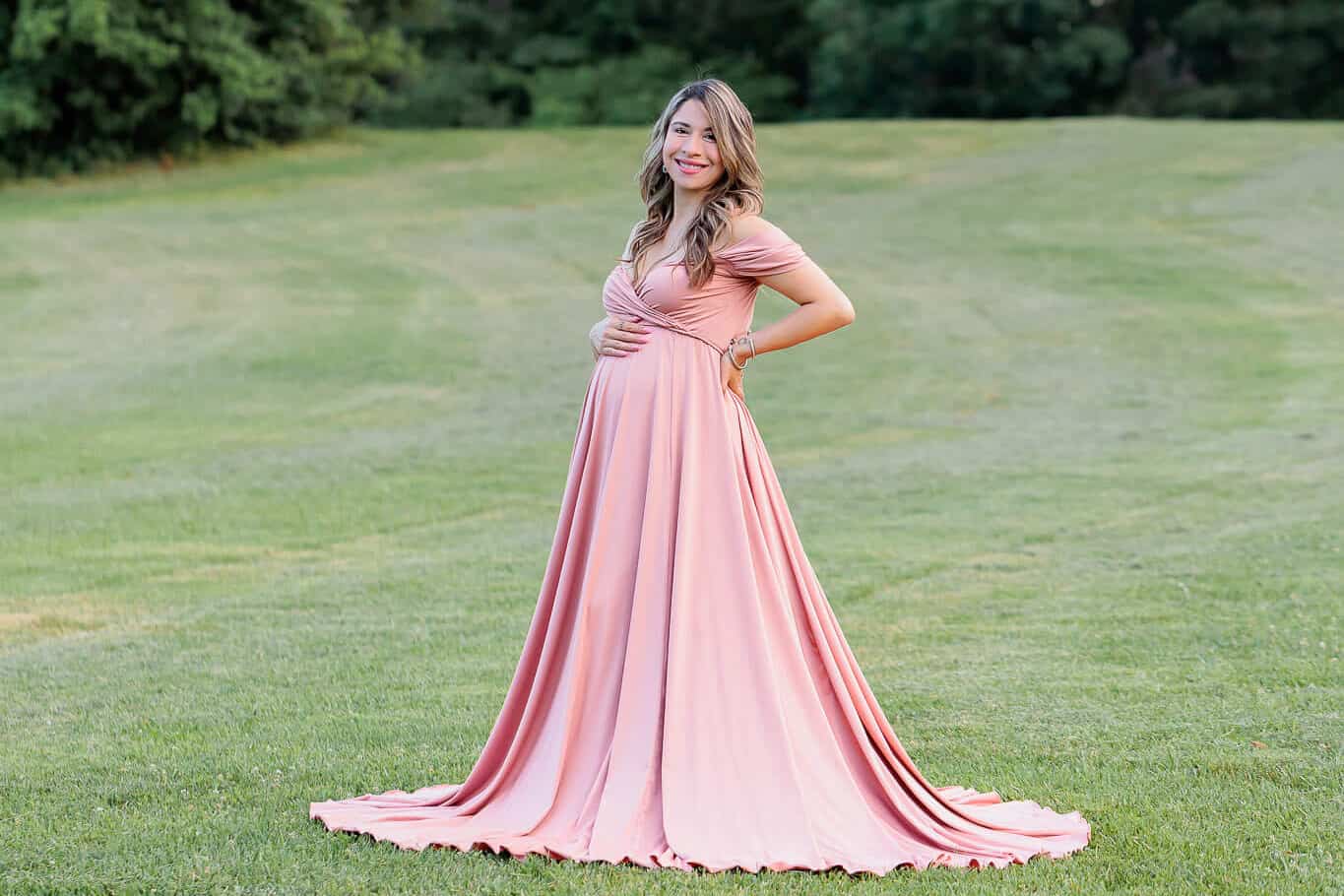
Photo by Melissa Driggers Photography
Fairfax Birth Care | An Informative Q&A with Doula Lauren Russo
Doulas have become an extremely popular support person to have at births, so if you’re in the market for a doula, you should definitely check out Fairfax Birth Care. Read this Q&A with owner Lauren Russo to get to know more about her and her business.
An Interview with Lauren at Fairfax Birth Care
Q: What kind of training do you have at Fairfax Birth Care? Are you certified, and if so, through which organization? Have you taken part in any continuing education programs?
A: In 2019 I completed both the Birth Doula and Postpartum Doula training programs with DONA, International which is the oldest, most reputable doula training worldwide. Through DONA, I gained my foundation in how I would go on to support women and families through pregnancy, the birth of their children, and the immediate postpartum and breastfeeding. That same year I also became a childbirth educator with MyBirth in Richmond, Virginia. I am constantly continuing education opportunities in many areas – I have over 90 hours of lactation-specific training and have earned CEUs in trauma-informed care, racial biases and inequalities in the medical model, biomechanics of the pelvis, and health safety and bloodborne pathogens as it relates to placenta encapsulation, just to name a few. I am also certified with BEST Doulas for placenta encapsulation.
Q: Why did you become a doula?
A: I had my first son when I was 23 years old and serving on active duty in the Navy at a large military hospital. I had no education, no doula, and his father was deployed. I was truly alone in the pregnancy and birth process. Months later I started reading other women’s birth stories and thought, “I didn’t know that was an option” and “why didn’t anyone tell me to ask for that???” It was then that I learned what a doula was, and I knew I wanted to help women make more informed choices in childbirth. A few years later as I planned my exit from the military, I became a doula. At the end of the day, I really don’t care what choices you make for your pregnancy and birth. I care that you felt fully informed of ALL options, understood the risks and benefits of all things presented to you, and that you felt supported in those decisions. As a doula for nearly four years and over 100 births, I know that Fairfax Birth Care can be that stability, that consistency, and that resource in your pocket so that you may have a positive and empowering pregnancy, birth, and postpartum experience.
Q: How long have you been a doula? How many births have you attended? Where do you typically work as a doula?
A: I have been a doula for four years and attended over 100 births. I support births in all settings – at home, birthing centers, and in hospitals. I have attended births at all major hospitals in the NOVA/DC area as well as the three major free-standing birthing centers, and I am well-connected to the homebirth midwives serving our area. It’s important to know that doulas aren’t just for homebirth or unmedicated births. If you’re pregnant, you deserve a doula!
 Q: How would you describe your doula style at Fairfax Birth Care?
Q: How would you describe your doula style at Fairfax Birth Care?
A: I am very big on education. I spend a great deal of time educating my clients on all of their birthing options so they can make informed decisions about their care. While we must find flexibility in childbirth, birth is not the time to “wing it” or “go with the flow.” It is the time to declare our desires and advocate. The words advocacy and empowerment are thrown around a lot when it comes to “what doulas do” but I rarely have to advocate for my clients because I have prepared them so well to advocate for themselves. And rather than empower women, I want to leave the power within them – to highlight that they already have the power – they just need to learn how to facilitate healthy and informed conversations with their provider to exert that power.
I am also fairly hands-off unless the mother really needs that extra level of support. I’m often asked what tools, materials, or “extras” I bring to a birth to support a mother and the answer is almost everything I need is in my head. While I do always have my handy rebozo which can be used for both comfort and assisting with fetal positioning, a few essential oils, some honey sticks and electrolyte packets for energy, and a comb for pain relief, I spend far more time prenatally coaching mothers through the mental intensity of labor and learning breathing techniques so that they can cope well, largely on their own and with the assistance of their partner. Birth is 90% mental and it is a process that is designed to work. No amount of hip squeezes and labor affirmations are going to get you through the intensity of active labor and transition if you have not mastered your breathwork and controlling your mind. Through my work one thing remains largely true – the mothers who are truly planning for unmedicated births do not get epidurals because of the pain – they get epidurals because they are exhausted and likely have not rested well enough in early labor.
Q: How do you support women in labor as a doula at Fairfax Birth Care?
A: In labor specifically, I have very open communication with my clients starting in early labor. I’m a big fan of over-communication (hello, 10 years of military service!) As clients are starting to feel the changes taking place, starting to feel their surges (or contractions) or maybe they’ve lost their mucus plug, or their water has broken and they are awaiting labor to truly begin, I am reminding them of all they learned through childbirth preparation classes and our prenatal appointments so that they recognize these are all normal changes and that it’s frankly a slow process most of the time, especially for first time mothers. While I always offer to support my clients’ labor in their home before transferring to their birth location, if that’s the hospital or birth center, or before calling their homebirth midwife to their home, I do encourage my clients to labor as long as possible with just their partner, if applicable, because labor works best with as few people, as few interruptions, as possible. The priority during early labor is to IGNORE IT, rest, and eat well because you will need energy later. Once labor has become active, I meet clients at either their home or birth location (their choice and usually depends on how the labor is progressing, how the mother feels she is coping with the sensations, and if her goal is to birth unmedicated or with an epidural). We continue to labor together using all of the skills they’ve mastered in pregnancy until the baby is born and then I stay for about an hour to 90 minutes after the birth to assist with the Golden Hour, newborn procedures, and initiating breastfeeding.
Q: How do you handle clients with similar due dates at Fairfax Birth Care? What happens if your client goes into labor early?
A: I take a limited number of clients per month so that I can give each family the personalized attention they deserve and minimize the chances of me needing to send a backup doula, but it has happened, and it has never happened with mothers who shared a due date, or even a due week. Birth is totally unpredictable and we know that normal pregnancies can last anywhere from 37-42 weeks. When I have overlaps it has always been because one mom went 2 weeks early while another went two weeks late – something I never could have predicted when I connected with them months prior. I am extremely well-connected in the birth community and have several doulas that I would trust with my own birth stories. In the very few instances I’ve needed to call in backup support, I have sent a competent doula with similar experience levels and shared philosophies on birth. I’ve never had a family be dissatisfied with their back-up doula and I really do believe that whoever is meant to be at your birth will be there.
Q: Do you meet with your Fairfax Birth Care clients before their birth? What is your process like before the actual birthing process?
A: Absolutely! When potential clients reach out to me we hold a complimentary zoom call that typically lasts about one hour so that they can ask questions and get a feel for who I am and how I might integrate into their birth team. When we agree to work together, my clients will take my comprehensive childbirth education course either live, in-person or virtually so we have a lot of interaction that way. We meet around 32 weeks to curate the birth plan and then again around 38 weeks to review contacting me in labor, getting through early labor, coping skills, and postpartum preparation. My clients have unlimited access to me via email, text, and phone calls throughout their entire pregnancy and I frequently have communication with them before and after most prenatal appointments with their providers.
Q: When are you typically on call for a birth? Do you stay for the entire labor and childbirth, or do you have a time limit for long births?
A: I am on call for my clients from point-of-hire unless otherwise noted, such as a known family vacation. That means if you have pre-term labor and are admitted to the hospital, or if you have to be induced at 37 weeks for a medical concern, you can still call me for support. Most mothers will birth 38-42 weeks (and most first time moms will pass their “due date” by more than a week!). I stay for the entire labor and birth assuming it is not an extraordinarily long birth in which case I may need to call in a back up since I will also need to rest at times. On average I spend 12-18 hours at a birth and after that I may need to call in a back up. This is why it’s extremely important to be educated on physiological labor and not call your birth team in, or head to the hospital too early. Early labor is the longest part of labor.
Q: Do you offer any postpartum care or follow up at Fairfax Birth Care? Do you have experience with breastfeeding instruction? Do you offer any additional services, such as placenta encapsulation?
A: Yes to all of this! After your birth, I will stay for approximately 60-90 minutes to help initiate breastfeeding. In addition to more than 90 hours of formal breastfeeding and lactation training, I have breastfed my two children for a combined 36 months. I am also well-connected to several International Board Certified Lactation Consultants (IBCLCs) in the DMV area so that you know who to contact when you have questions. Part of my prenatal care is working with families to identify what lactation services their insurance covers, if any, and finding an IBCLC within those parameters. Most lactation questions don’t happen in the first 36 hours postpartum when you’re at the hospital with access to an IBCLC so my families always know signs to look for in breastfeeding struggles and who to call and when.
Within two weeks of your baby’s birth I will conduct a home visit if the family is accepting visitors. During this time, I will bring a meal or nutritious snacks for the mother and, if the mother desires, we will discuss and process the birth experience. We will discuss what is currently working for the family, what struggles are present, and how to best handle those obstacles. Typically we spend a lot of time discussing breastfeeding, baby wearing, and how to get more sleep. We always discuss mental health and signs of postpartum mood disorders and where to seek help. This visit is typically 60-90 minutes. I am able to make referrals to other specialists in our area if necessary, such as to oral tie specialists, IBCLCs, craniosacral therapists, infant chiropractors, and mental health professionals.

Q: Is there anything else you would like potential clients to know about hiring Fairfax Birth Care for their birth?
A: You deserve a doula! What I wish more people understood is that a doula can’t save you; we aren’t bodyguards. If you interview doulas and hear, “I don’t attend births at that hospital or with that provider,” ask why. She probably has a good reason and experience that has led her to that choice. Countless times I have met with mothers who say, “well I know that doctor/hospital isn’t ideal but since I’ll have you to advocate for me it will be okay” and that is just not something I want for families. You deserve so much more! Birth isn’t the time to have to be confrontational and you want your birth team to feel cohesive and like everyone’s on the same page.
Also, hiring a doula is not a substitute for formal childbirth education preparation. We cannot educate families on the fly when they are in pain, naked, vulnerable, and nervous about what is coming next. That’s why we do so much prep work while you are pregnant. It pays off, I promise.
Doulas support all types of births. In the words of January Harshe of Birth Without Fear, “I don’t care what kind of birth you have…a homebirth, scheduled cesarean, an epidural hospital birth or if you give birth alone in the woods next to a baby deer. I care that you had options, that you were supported in your choices and that you were respected.” This is truly the mantra that rules my business and my interactions with families. There is more to birth than “healthy mom, healthy baby.” We can also have non-traumatized parents, avoid unnecessary interventions, and involved, supportive birth partners. Healthy and alive is the basement floor of care and what we EXPECT! We must demand the rest, and we will work for it, together.
Doulas are often friends for life.
You can learn more about my services by visiting my website www.fairfaxbirthcare.com and following me on Instagram @fairfaxbirthcare. I am always available to consult with families about their birthing options in the DMV as well as preconception counseling with consideration to what type of prenatal care they desire, such as the differences between OB/GYN and Midwifery care or birthing in or out of hospital. It’s never too early to ask questions or to learn what questions to ask because you don’t know what you don’t know. Got questions? I’d love to hear from you via email – lauren@fairfaxbirthcare.com.
A huge thank you to Lauren at Fairfax Birth Care for taking the time to answer my questions for all of you. You can visit her website for more information here.
Fairfax Birth Care
Since you’re checking out a blog about Fairfax Birth Care, I’d love to talk to you about your NOVA maternity photography needs! Check it out and get in touch!
Looking for more Northern Virginia maternity advice? Check out the links below:
Melissa Driggers is an award winning Northern Virginia photographer. Her work has been featured in various magazines. She offers outdoor and studio maternity, lifestyle newborn, and family photography in her true to color, timeless style.
Melissa serves Fairfax, Springfield, Alexandria, Arlington, Manassas, Woodbridge and surrounding areas in Northern Virginia & Washington DC